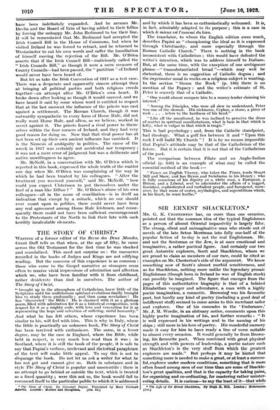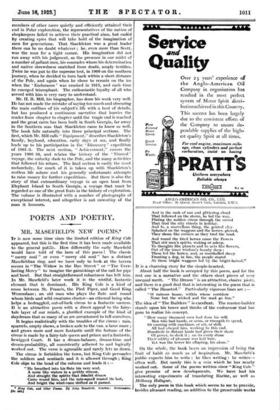SIR ERNEST SHACKLETON.*
Mn. G. K. CHESTERTON has, on more than one occasion, pointed out that the common idea of the typical Englishman as a person of almost Oriental impassivity is largely false. The strong, silent and unimaginative man who strode out of novels of the late Seton Merriman into fully one-half of the popular fiction of to-day is not the real Englishman. He, and not the Scotsman or the Jew, is at once emotional and imaginative, a rather poetical figure. And certainly our two great Antarctic explorers, Scott and Shackleton, whom we are proud to claim as members of our race, could be cited as examples on Mr. Chesterton's side of the argument. We know something now of Scott's almost morbid sensitiveness, and as for Shaddeton, nothing more unlike the legendary prosaic Englishman (though born in Ireland he was of English stock) can possibly be imagined. The figure that emerges from the pages of this authoritative biography is that of a belated Elizabethan voyager and adventurer, a man with a highly poetic imagination, a romantic. Browning' was his favourite poet, but hardly any kind of poetry (including a good deal of indifferent stuff) seemed to come amiss to this merchant sailor and explorer. One of his comrades in the ` Endurance,' Mr. J. M. Wordie, in an obituary notice, comments upon this highly poetic imagination of his, and further remarks " It is well expressed in his writings and in the naming of his ships ; still more in his love of poetry. His wonderful memory made it easy for him to have ready a line of verse suitable to almost every occasion. It would generally be from Brown- ing, his favourite poet. When combined with great physical strength and with powers of leadership, a poetic nature such as Shackleton's is the very stuff from which the greatest explorers are made." But perhaps it may be hinted that something more is needed to make a great, or at least a success- fid, explorer under modern conditions, something that is more often found among men of our time than are some of Shackle- ton's great qualities, and that is the capacity for taking pains, for organizing and co-ordinating, for mastering rather uninter- esting details. It is curious—to say the least of it—that while • The Lift of Sir Ernest Shackkion. By Hugh B. MM. London; Heinemann. 1218.1
members of other races quietly and efficiently attained their end in Polar exploration, the representatives of the nation of shopkeepers failed to achieve their practical aims, but ended by creating epics that will take hold of the imagination of men for generations. That Shackleton was a great leader there can be no doubt whatever ; he, even more than Scott, was the man for a tight corner. His imagination did not run away with his judgment, as the presence in our midst of a number of gallant men, his comrades whom his determination and native shrewdness snatched from death, amply testifies. Twice he was put to the supreme test, in 1909 on the southern journey, when he decided to turn back within a short distance of the Pole, and again when he chose to remain on the ice when the ' Endurance ' was crushed in 1915, and each time he emerged triumphant. The enthusiastic loyalty of all who served with him is very easy to understand.
Mr. H. R. Mill, his biographer, has done his work very well. He has not made the mistake of saying too much and obscuring the main outlines of his subject's life with a host of details, but has produced a continuous narrative that hurries the reader from chapter to chapter until the tragic end is reached and the great cairn has been built in South Georgia, far away in the Southern seas that Shackleton came to know so well. The book falls naturally into three principal sections. The first, which Mr. Mill calls " Equipment," describes Shackleton's family, boyhood, education, early days at sea, and finally leads up to his participation in the Discovery' expedition of 1901-3. The next section, " Achievement," covers the years 1906-10, and relates the history of the Nimrod ' voyage, the unlucky dash to the Pole, and the many activities that followed his return. The final section is easily the most melancholy, for much of it is taken up with Shackleton's restless life ashore and his generally unfortunate attempts to raise money for further expeditions. But there is also the story of that extraordinary voyage in an open boat from Elephant Island to South Georgia, a voyage that must be regarded as one of the great feats in the history of exploration. The volume is illustrated with a number of photographs of exceptional interest, and altogether is not unworthy of the man it honours.







































 Previous page
Previous page